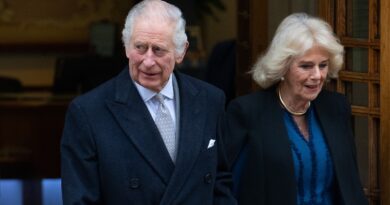U.S. Embassy personnel in Haiti evacuated amid rising violence
Armed gangs have taken power in as much as 90 percent of the Haitian capital since the assassination two years ago of President Jovenel Moïse. Even as they contest territory and control of resources with each other, they have engaged in widespread campaigns of killings, rape and displacement of civilians.
Families have been burned out of their homes and left without food and water, a new cholera epidemic threatens, and a U.N. humanitarian campaign has received only a fraction of requested funding for the rest of the year.
Since Moïse’s death, the political chaos that has plagued Haiti for decades has worsened. His replacement, Prime Minister Ariel Henry, called for a multinational force last October to intervene and control the gangs. But the international community has been unable to work out how to form it, and no country has agreed to lead such a mission.
The United States, with its own history of interventions in Haiti, has expressed no interest in spearheading such a force. Hopes that Canada would take the lead also fell apart.
Meeting with Henry this month during a visit to Trinidad and Tobago, U.S. Secretary of State Antony Blinken said it was “imperative … for the international community to come together in support of Haiti.”
The idea for a multinational police force grew largely out of reluctance to send another U.N. peacekeeping force. An earlier U.N. force, sent to stem the growth of gang violence, was accused of sparking a cholera epidemic and failing to end the anarchy, and was highly unpopular with the Haitian people.
“We are not calling for a military or political mission of the United Nations,” U.N. Secretary General António Guterres said this month after visiting Haiti. “We are calling for a robust security force by member states to work hand-in-hand with the Haitian national police to defeat and dismantle the gangs and restore security across the country.” Civilians are trapped in “a living nightmare,” Guterres also, calling the conditions there “beyond appalling.”
But shortly after those comments, with no agreement on a non-U.N. force in sight, the U.N. Security Council on July 14 unanimously passed a resolution giving Guterres 30 days to report back with an outline of “the full range” of support options that the United Nations can provide, including a “possible peacekeeping operation.”
Such a U.N. force would require a Security Council vote, with no veto from one of the council’s five permanent members. Among them, China indicated skepticism, with Beijing’s U.N. representative instead saying that “all countries” must stop arms trafficking to the gangs and warning against “quick fixes implemented from the outside” that have long failed to deliver long-term results.
U.S. officials have continued to express optimism that some country will emerge to lead a non-U.N. force. “We continue to work with partner nations to identify a lead nation for a police-driven, multinational force,” State Department spokesman Matthew Miller told reporters last week. “It is urgently needed, as the secretary said. I don’t have any updates … but I do hope to have them in the near future,” Miller said.
The U.N. resolution urgently called on “all Haitian stakeholders” to establish, with help from the United Nations, “a Haitian-led, Haitian-owned political process to permit the organization of free, fair and credible legislative and presidential elections.”
In the meantime, a new force has arisen in Haiti, with civilian vigilantes responding to the lack of security control by forming their own armed groups to combat the gangs.


